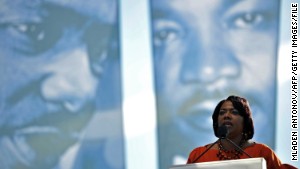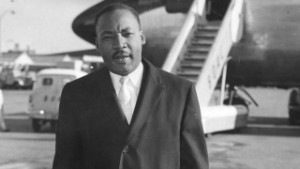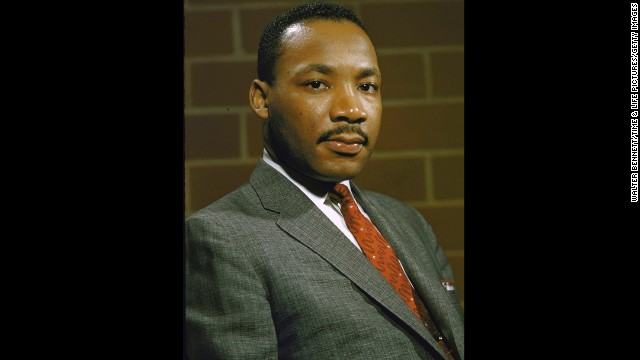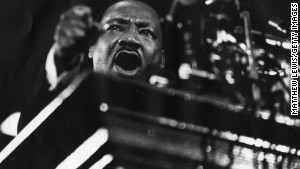The greatest MLK speeches you never heard
updated 8:14 AM EST, Mon January 20, 2014
STORY HIGHLIGHTS
- King's "overlooked gems" spotlight leader's hidden side
- Some MLK works never got attention they deserved
- Scholar: "He was a revolutionary"
- One speech even infuriated civil rights leaders
(CNN) -- Here's a pop quiz for anyone who calls the Rev. Martin Luther King Jr. an American hero.
Can you name any of his great speeches or written works without citing "I Have a Dream" or the "Letter from Birmingham Jail"?
Most Americans would likely flub this quiz. King may be a national hero whose birthday the country commemorates on Monday, but to many he remains a one-dimensional hero -- the vast body of his work unknown. Though he wrote five books and delivered up to 450 speeches a year, he's defined by one speech and one letter.
What then are the great works by King that never get the attention they deserve?
Martin Luther King speaking at Vermont Ave. Baptist Church in Washington, Febuary 1968.
That's the question CNN put to some members of King's inner circle as well as top King scholars. We asked them to pick their favorite overlooked gems from King, any extraordinary spoken or written words people don't typically hear during King commemorations.
Six entries made our final cut: three sermons and speeches, King's most radical book, an astonishing letter he wrote as a college student, and a "eulogy" he delivered for a friend that revealed a side of him the public rarely saw.
'A Time to Break the Silence'
Sermon delivered at Riverside Church in New York on April 4, 1967.
Why it's important: This was King's most controversial speech. Even some members of his own staff warned him not to give it. With this sermon, King decisively came out against the Vietnam War at a time when many Americans still supported it. People were furious. President Lyndon Johnson stopped talking to him. Civil rights leaders criticized him, and major newspapers told him to stick to civil rights. Yet King put principle over personal popularity and continued to oppose the war. One year later to the day he gave this speech, King was assassinated in Memphis, Tennessee.


What he said: Money that should have been spent on Johnson's War on Poverty was being lost in Vietnam's killing fields. He said, "A nation that continues year after year to spend more money on military defense than on programs of social uplift is approaching spiritual death." The speech distilled King's belief that racism, economic exploitation and war were all connected as "triple evils."
Signature lines: "We are taking the black young men who had been crippled by our society and sending them 8,000 miles away to guarantee liberties in Southeast Asia which they had not found in Southwest Georgia and East Harlem. So we have been repeatedly faced with the cruel irony of watching Negro and white boys on TV screens as they kill and die together for a nation that has been unable to seat them together in the same schools."
What others say: "It's Dr. King's most underappreciated speech," says Vorris Nunley, a professor of rhetoric at the University of California, Riverside. "Former supporters, black as well as white, backed away from this too compassionate, too radical, too political King."
'Our God is Marching On!'
Speech delivered on March 25, 1965, in Montgomery, Alabama, at the end of the Selma-to-Montgomery march.
Why it's important: It is one of King's most electrifying speeches. When the roaring crowd joins King in shouting "Glory hallelujah!" at the end of the speech, the march becomes a church revival. The speech was the culmination of one of the movement's most brutal but critical campaigns. Three civil rights activists were killed and other marchers were beaten at the Edmund Pettus Bridge. King gave his defiant speech while standing on the steps of the Alabama State Capitol in Montgomery, a city known as the "Cradle of the Confederacy." This was the high-water mark of the civil rights movement. The Selma campaign would spark the passage of the 1965 Voting Rights Act.
What he said: King praised the white clergy and laypeople of various faiths who traveled to Selma to face danger with African-American protesters. He said that segregation was "on its deathbed" and the movement must now be prepared to "march on poverty."
Signature lines: "They told us we wouldn't get here. And there were those who said that we would get here only over their dead bodies, but all the world today knows that we are here and that we are standing before the forces of power in the state of Alabama saying, 'We ain't going to let nobody turn us around.'
"I come to say to you this afternoon, however difficult the moment, however frustrating the hour, it will not be long, because 'truth crushed to earth will rise again.' How long? Not long, because 'no lie can live forever.' ... How long? Not long, because the arc of the moral universe is long, but it bends toward justice."
What others say: The speech marked the triumphant end of the first phase of the civil rights movement -- seeking legal and political rights -- and the beginning of a new phase focused on economic

 American civil rights leader the Rev. Martin Luther King Jr. is best known for his role in the African-American civil rights movement and nonviolent protests. His life's work has been honored with a national holiday, schools and public buildings named after him, as well as a memorial on Independence Mall in Washington. Take a look back at the civil rights leader's defining years.
American civil rights leader the Rev. Martin Luther King Jr. is best known for his role in the African-American civil rights movement and nonviolent protests. His life's work has been honored with a national holiday, schools and public buildings named after him, as well as a memorial on Independence Mall in Washington. Take a look back at the civil rights leader's defining years.